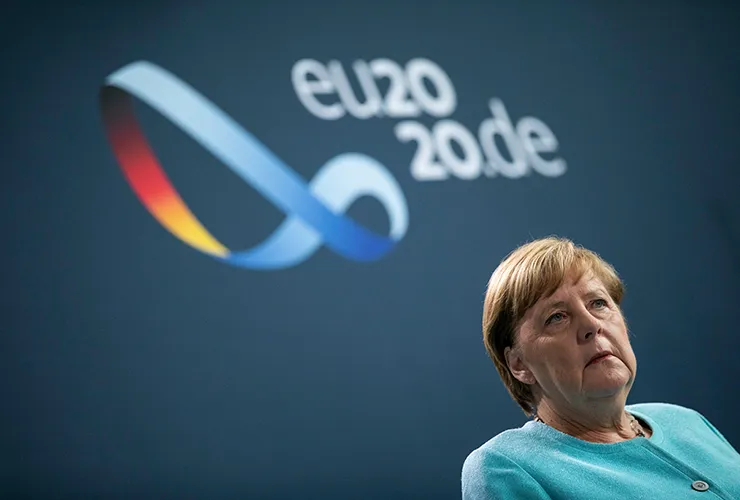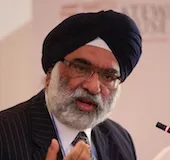
Germany is the President of the Council of the European Union (EU) from July to December 2020. It has worked towards a combined effort with its two successors, Portugal and Slovenia, to work out a
trilateral plan - ‘Together for Europe’s recovery’. This was to have continuity with both successors of Germany to the EU presidency and was worked out in June 2020 to provide a smooth transition over 18 months within the
Strategic Agenda 2019 – 2024.
The most notable and committed EU leader is surely Angela Merkel, and the EU Presidency during the Covid-19 crisis will mark her last major European role before she relinquishes office in Germany next year. It is also notable that the European Commission (EC) President is a former German Defence Minister, Ursula von der Leyen. Thus, during the pandemic, Europe has two steady German women leaders at the helm.
Merkel had led the EU in 2007 during her initial term and was known to support the value of unity. Her first term was just before the financial crisis. The German term comes once in 13 years. The Trio and Strategic programmes focus upon protecting EU citizens and their freedoms; supporting a dynamic and robust economy; pursuing a climate friendly and just society and promoting European interests and values globally.
The goals of the German Presidency had included these objectives as well as enhancement of digitalization, reforming policy on migration and creating a new matrix for reengaging the EU with the U.K. and China.
EU expected Germany to develop Europe’s capacity to manage the Covid-19 crisis, deal with new issues challenging EU integration and to pass the ambitious Euro 750 billion stimulus package. The success of the German presidency will be known by its fulfilment of EUs rising expectations at this critical time.
Amidst the Covid-19 crisis
The German Presidency has the pandemic as its most pressing problem. Germany’s own handling was encouraging and was expected to lead to similar responsive handling in other parts of the EU as some of the members went through a bad experience. Germany promoted a ‘Team Europe’ approach. A coordinated system of travel restrictions and their lifting, included a decision on which third countries to open travel to. Support to EU-wide health systems through equipment collated and distributed
through RescEU was created. Public procurement was coordinated and a new EU4Health created to contribute to post-pandemic recovery. It ought to have resilient health systems and promote health sector innovations and technology. Sharing the burden, the solutions and the equipment to deal with the Covid-19 crises has been the quiet and efficient way forward during the German Presidency. However, cases in
EU have risen in a second wave. Germany, France Poland, Portugal, Slovenia, Italy and Spain are all showing major increases in cases as of October 2020. Previous months of experience has put the EU and its members in a better place of preparedness to deal with the same.
The EU is also working towards a vaccine and with WHO, which Germany and EU support, a global access system is being sought. The EU is ready to place advance orders to facilitate vaccine production.
The economy
Germany was clear that special efforts to lead an EU recovery were necessary to bring back employment and productivity. Euro 100 million is budgeted for supporting job creation in member states and Euro 37 million for member’s pandemic response. The biggest achievement was the passage of the special ‘
Next Generation EU’ Euro 750 billion fund for EU recovery. Originally intended to provide Euro 500 billion in grants and 250 billion in loans, Germany negotiated with the four active smaller EU members (Denmark, Austria, Netherlands, Finland) and ultimately reduced the grants by 50 billion to obtain their concurrence. This exercise was a new effort by Germany to engage others rather than seek acceptance of its views. This unprecedented fund was a supplement to the regular
Multiannual Financial Framework (MFF), the 7-year EU budget, which has a significant Green component. A third of the new fund will also be dedicated to the Green economy as Germany and France had agreed in May 2020. Thus, Germany has stood by its
European Green Deal, despite the pressures of the pandemic.
The loans and grants will be disbursed till 2023 and Italy and Spain will get more than Euro 40 billion each as grants; Poland 18.7 billion, Greece 12.6 billion and Portugal 9.7 billion euros. Germany and France will also get 15.2 and 22.7 billion each. The UK, following Brexit, will not be part of this plan. Commonly issued EU debt will hopefully bind the remaining 27 EU members a little more closely.
Foreign relations
When the German Presidency started, Brexit, China and the USA were its main challenges. The other activities were expected to go on as usual, such as the
India-EU Summit (July 2020) in which the German Presidency is not directly involved. In October, the Africa-Europe Summit was expected to take place but was postponed. This effectively
derailed a new African Partnership strategy that was in the works. While the
EU-China Summit took place in September, the German initiative for a EU 27 summit with China in Leipzig also set for September under a German initiative had to be postponed. Though Covid-19 was cited as the reason, Berlin had hoped to make that a big event as it would have been the first meeting of all EU leaders with President Xi during the German Presidency. A reorganization of the EU-China relationship, more open opportunities for European companies and Chinese commitment to a green economy were the expected outcomes on the table. Evidently, these were unlikely, and the Hong Kong situation also changed making the success of the summit doubtful. This led to a virtual engagement with low expectations.
Germany tried to evolve a more cogent relationship with China based on the desire of its business groups and an effort to have a policy variation from the USA. This did not succeed with China not attaching the same importance to the development of this approach. Europe seeks alteration in China’s behaviour on economic issues, green commitments, human rights, and security. Without conceding any of these, Beijing secured an agreement to keep engagements constant. Till such time as things change, China continues to enjoy the benefits of the current situation. Germany turned to stronger positions during the visit of
Chinese Foreign Minister Wang Yi to Berlin and in a statement on
human rights in China at the UN that it led.
However, the economic decoupling which is the buzz word outside Europe is not encouraged in this period. German companies have important interests in China and are unwilling, at this stage, to concede them for strategic reasons. Thus,
Germany launched its own Indo-Pacific policy guidelines which were relatively soft on China. This has led Berlin to initiate an EU policy for the Indo-Pacific which is a new initiative during its Presidency. While it may not become a challenge to China, it will indicate that
the EU takes the situation in Asia more seriously than believed. Germany is attempting to take the EU into harder political positions on China without economic disengagement.
Besides China, Germany’s own concern now is with Russia and the
poisoning of opposition figure Alexei Navalny who was treated in Germany. Unlike China, with Russia, Germany is considering more economic reaction to its political acts including a possible demurring on the Nord Stream 2 gas pipeline in which Merkel had invested significant political capital. Germany is also leading EU response in the political dogfight in Belarus.
The EU-wide concern with the administration of President Donald Trump, and now the US elections, is fueling further anxiety in Berlin and its vision for Europe. Whether Trump or Joe Biden win the US election on 3 November, Germany sees the need to have an EU which stands more for itself. With Trump, this has become disruptive. With Biden it could be better managed. At this time, the German presidency has made it clear that the EU is under threat from China, Russia and the USA, and needs to advance its own strengths and vision without giving up its values.
Due to these overpowering anxieties, Brexit has taken a back seat and largely left to the negotiators. London’s loud thinking is not matched by Germany or EU reaction, but the lines are clearly drawn out. Germany knows that at the end of its term, the UK will not be in the EU. The terms it achieves now depends on UK’s choices and Germany is not making any move to alleviate UK’s concerns and sticking to the European position.
Thus, on the whole Germany has not interfered with EUs ongoing programmes or decisions but has contributed some initiatives and provided political leadership in achieving EU goals. It is not oblivious to its own domestic intents but has taken up the EU vision with greater clarity. Berlin has shown a perspective about global changes and how EU could respond without diminishing its core values. It has shown no inclination to move strategically in a realist manner preferring to expand its vison on a functional basis.
The views expressed above belong to the author(s). ORF research and analyses now available on Telegram! Click here to access our curated content — blogs, longforms and interviews.



 Germany is the President of the Council of the European Union (EU) from July to December 2020. It has worked towards a combined effort with its two successors, Portugal and Slovenia, to work out a
Germany is the President of the Council of the European Union (EU) from July to December 2020. It has worked towards a combined effort with its two successors, Portugal and Slovenia, to work out a  PREV
PREV


